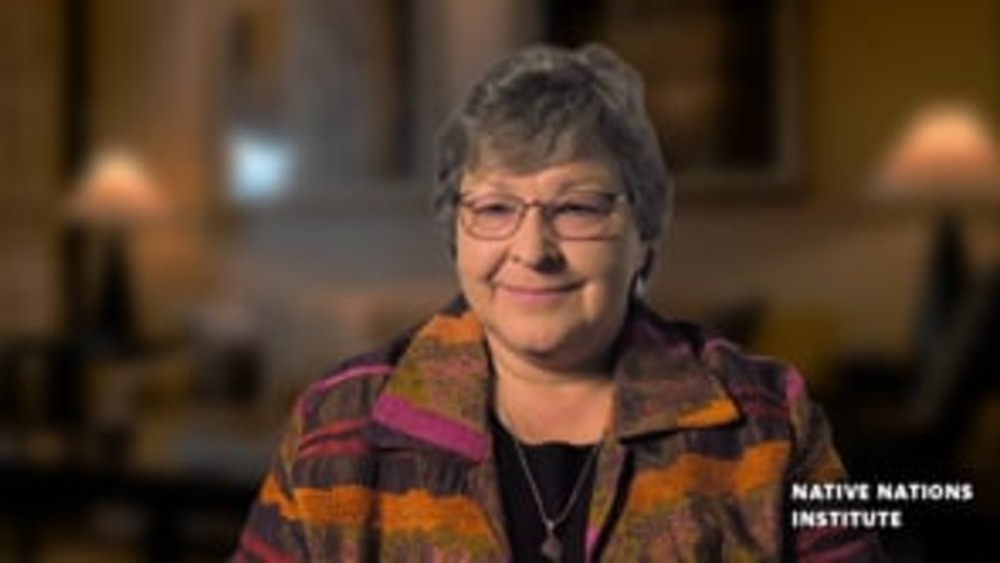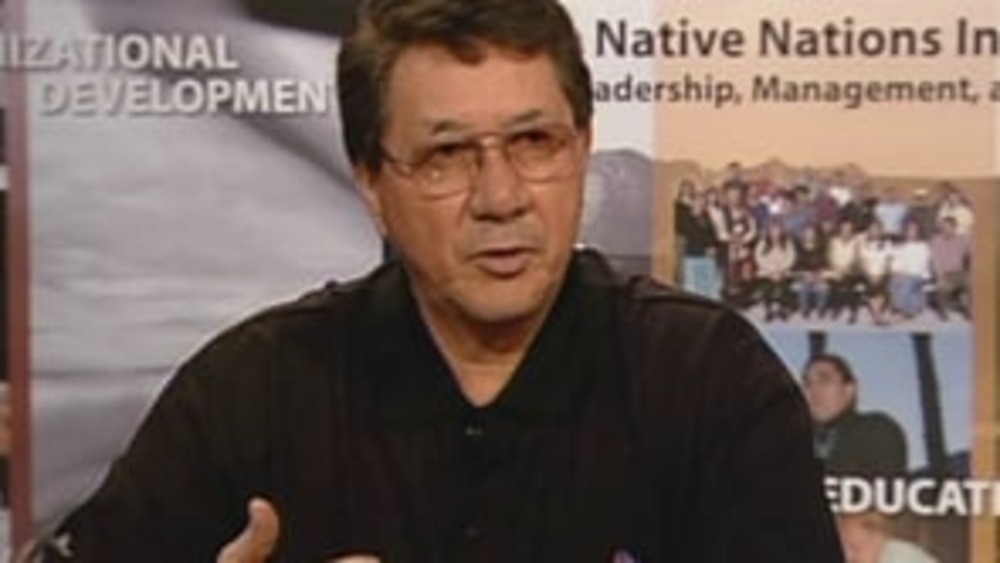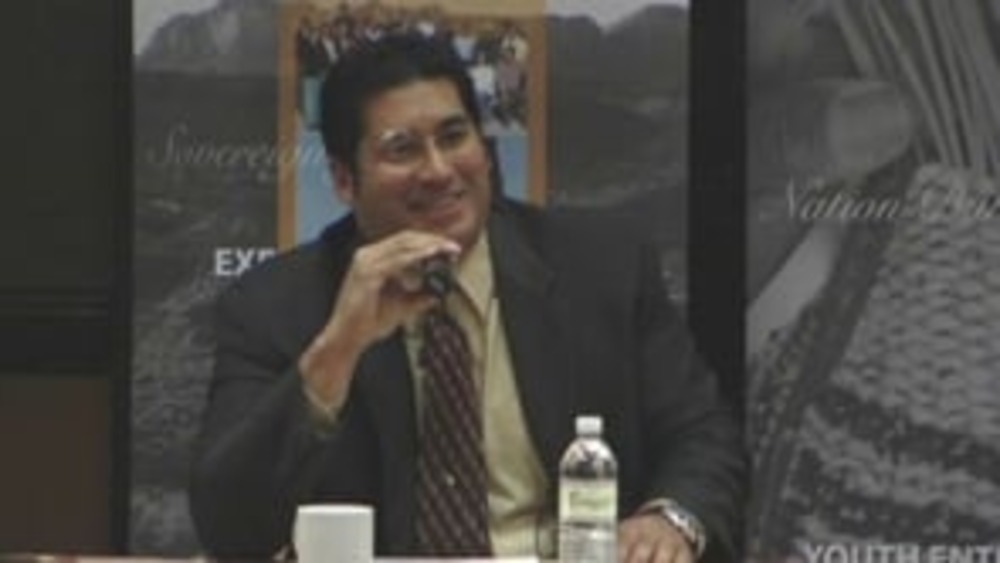Native leaders discuss the need for Native nations to define the distinct roles of elected leaders and administrators, and the importance of leaders delegating responsibilities to those appropriately charged with day-to-day administraion.
Additional Information
Diver, Karen. "Sovereignty Today." Honoring Nations seminar. Harvard Project on American Indian Economic Development, John F. Kennedy School of Government, Harvard University. Cambridge, Massachusetts. September 16-18, 2009. Presentation.
Ducheneaux, Wayne. Native Nations Institute for Leadership, Management, and Policy, University of Arizona. Spearfish, South Dakota. April 11, 2012. Interview.
LaPlante, Jr., Leroy. Native Nations Institute for Leadership, Management, and Policy, University of Arizona. Tucson, Arizona. August 12, 2010. Interview.
Marquez, Deron. Native Nations Institute for Leadership, Management, and Policy. University of Arizona, Tucson, Arizona. March 26, 2009. Interview.
McCoy, John. Native Nations Institute for Leadership, Management, and Policy, University of Arizona. Cambridge, Massachusetts. September 18, 2009. Interview.
Minthorn, Antone. Native Nations Institute for Leadership, Management, and Policy, University of Arizona. Cambridge, Massachusetts. September 17, 2009. Interview.
Mitchell, Michael K. Native Nations Institute for Leadership, Management, and Policy, University of Arizona. Tucson, Arizona. 2008. Interview.
Transcript
Michael Mitchell:
"And I had one policy. I didn't think we had any business running the administration side. We're politicians. So I had discussion with council, saying, 'Let's do our politics, and we hired these people -- let them do their administration.' So separating administration and politics was one of the first objectives, and it worked."
Urban Giff:
"...Have a better understanding among all the players, all the decision-makers as to who has the resources to do what, and that's where the bureaucracy comes in. The bureaucracy [is] there, the bureaucrats are there because they have qualifications in their respective areas. The politicians are there because they have rapport with the voters and they have the vision for the tribe. And if you put those two together, the politicians with their vision of what is to be done, what they're striving to get done, and the bureaucracy and the bureaucrats of how it's to be done, that can't help but win for the tribe. So no one segment can do it alone. They have to work together as best as they can."
Leroy LaPlante, Jr.:
"I think there's a short-term effect and that the interference, it prevents those programs from functioning the way they're supposed to, it prevents them from hiring the way they're supposed to, making personnel decisions the way they're supposed to, making fiscal decisions the way they're supposed to. But I think the long-term is it detracts from what their job really is, and that is to plan long-term for the tribe. To think where, you know, the bigger decisions. So you kind of have this hierarchy of needs in a tribal government; you have these everyday daily operations. And, you know, who decides, you know, what to purchase with a particular program budget is a very small matter. But when you have legislators and tribal council members making those kinds of decisions, obviously, that's gonna take away from the bigger things they should be doing, which is planning for the tribe's future, creating laws that are going to be implemented for the improvement of the tribe. And so it does detract from those bigger things, and those are the things that they're elected to do. And so that's what I meant by a short-term effect and a long-term effect."
Wayne Ducheneaux:
"I think that's most everybody's approach is to bail in and get busy and get helping. It's a very hard thing to do to step back, especially when you're an elected official. You only have 'X' amount of years to get what you want accomplished so of course you're going to want to bail in and make that quick change. It is hard to plan out for the future but that's what we have to do is when you become an elected official is you have to think about the bigger picture."
John McCoy:
"That's where the leadership, the elected leadership – their role is to set policy. Their role is not day-to-day administration. They set policy, then let their organizations function. Trust them – they'll do the right thing."
Deron Marquez:
"Having the right people in place from legal to the chief financial officer to the operations of our various businesses is critical when you're out there trying to address and deal with state issues, county issues, federal issues. To rely upon those individuals makes my job a lot easier. Yesterday we talked a lot about micromanagement. If you want to have a big headache and you don't want to sleep at night, micromanage. There's a quicker, easier way to get this done and that's not it. Hire talented people. Put them in the position, give them the authority to make decisions, support their decisions and you will have an easier life as a chair."
Antone Minthorn:
"Let managers manage. Don't micromanage, and hire the people that are smarter than you, meaning that that's their job. I can't go in and be a real estate agent, 'cause I'd have to do a lot of study for a long time to make that happen. So we have to bring in the right people."
Karen Diver:
"I have 28 different divisions. I'm not an educator. I am not a healthcare administrator. I certainly am not an environmentalist. Why on earth wouldn't I use the expectations and the skills of my staff to inform my decision making? The accountability comes is if they get it wrong. 'Okay, you mucked that one up. Now what you going to do to fix it?' That's their role. We set policy and vision. They know what the vision is. They have to come prepared to us to own it. I am not going to take responsibility for every single bit of work that comes out of my reservation. We have 2,000 employees. How could I even think I could do that? But they did. Then they wondered why they had eight-hour meetings and never had time for people and never were able to set the vision. It's a vicious little cycle. We use our own power to keep us out of touch with our own people. And we don't hold our staff accountable because of it. Basic management principles: distinguish between decision making and what is planning; use your tribal council to plan; use what you have to under your own rules for decision making; and then let your staff do their work."



